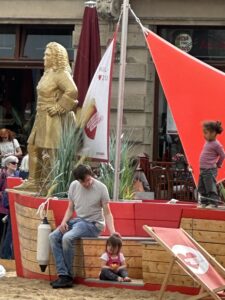Some images of the Handel Festival in Halle: notably, a statue of Handel as the figurehead on a children’s pirate ship and the child who unintentionally happened to be in the same pose.
The particular location of Halle as the site for this Handel Festival prompted me to think about why or how it comes to be that we attribute certain places to composers. Many large music festivals, such as the Bachfest Leipzig, Beethovenfest Bonn, and the Salzburg Festival, which emphasizes the work of Mozart, are held in cities where these composers spent a significant portion of their lives. In contrast, the Handelfest being in Halle seems out of place. Handel merely spent his adolescence here compared to the more formative years of his life spent in Italy and Hamburg, and the vast majority of his life spent in London, the site of another Handel Festival. Being the birthplace of Handel, I find that Halle does hold some significance regarding the composer, but it’s more of a postmortem significance implemented by historians and fans.
This point addresses the idea of wanting ownership, mentioned in class and the Agrippina preview session. We, in the present, look at people from the past and choose where we identify them. It becomes a question of who gets to hold the responsibility of having built the figure rather than where the figure identifies themself. For Handel, it is a debate concerning nationalistic pride regarding the composer as a champion from Germany or as the world-renowned British Subject that he was.
This idea of postmortem identity building then brings us back to Bach, particularly the location of Leipzig for the Bachfest. Bach spent a significant portion of his career in Leipzig, but it is also important to note what the composer actually thought about the city. It’s difficult to know definitively what Bach felt about Leipzig with so little writing. However, I found his relationship with the city to be somewhat questionable, given his failed attempt at applying for the Kapellmeister position in Dresden and his general attitude towards his role in Leipzig, discussed during our visit to the Bach Archiv. Overall, I find it valuable to distinguish the conceptions of historians from the contemporary sentiments of those being studied. We can so easily get caught up in popular opinion that we fail to notice the more nuanced relationships historical figures have with the places we associate them with.


Vito, These are great points. The question of nationalism here is an important one, and it is no coincidence that the compiling of collected editions of Handel, Bach, Rameau, Monteverdi, etc happened in the late nineteenth century as feelings of nationalism were growing. The politics in the Handel editorial board are complex because of the German-English competition – is it Händel or Handel? And the marketing is important, as Caroline pointed out! But I think we do need to separate out these things — as I mentioned in Caroline’s post, the marketing of Mozart in Salzburg is over the top — and he HATED Salzburg and couldn’t wait to get to Vienna! But there are those chocolates with his face on them…!